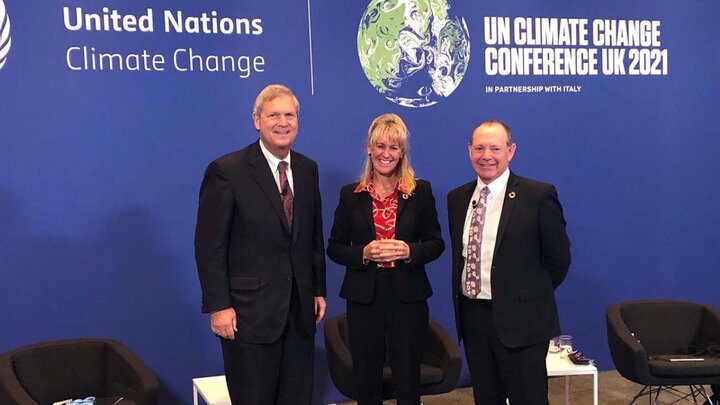The Glasgow Climate Conference ended on November 13, 2021. With me to discuss what the conference accomplished and what that might mean for Nebraska agriculture is Dave Aiken, UNL Water and Agricultural Law Specialist.
So, what was the Glasgow climate conference? It was the 26th UN “conference of the parties” regarding implementation of the 2015 Paris climate agreement.
What did the parties agree to? Not much. They agreed to reduce methane emissions, to phase out coal-fired electricity plants in favor of clean energy, to speed up the use of electric vehicles (EVs) and to reduce forest loss. However, the U.S. and other industrial countries did not agree to reduce their greenhouse gas (GHG) emissions sufficiently to limit global warming to 1.5° Celsius.
What is the global methane pledge? 108 countries, including the U.S. and the European Union, agreed to reduce methane emissions 30% by 2030. Each country determines how they will accomplish their 30% reduction. In the U.S. the largest sources of methane emissions are livestock production and oil and gas development.
How will the U.S. attempt to reduce methane emissions from livestock emissions? That is yet to be determined, and I expect we will be watching this closely in the months to come. My best guess is that they will rely on livestock feed additives and manure management incentives.
What is the “ending coal” pledge? Developed countries have pledged to transition away from coal electricity generation by 2030 and developing countries by 2040. Over 50 countries have signed the pledge, although some qualified their commitment to move away from coal power generation more slowly. China, the U.S., and India, who have the three largest coal-fired power fleets, did not sign the ending coal pledge. If the three major coal users don’t participate, this pledge won’t mean much, although they can sign on any time.
What is the EV pledge? Developed countries will try to have 100% of new cars and vans sold be EVs by 2035 and in all countries by 2040. This won’t mean much however if EVs are powered by fossil-fuel generated electricity.
What is the forest loss pledge? Over 100 countries pledged to slow and ultimately stop forest loss by 2030. However, many signatory countries are already behind prior forest protection pledges. Like the other pledges, it is easier to agree to this but very difficult to successfully follow through.
So, what is your overall take on the Glasgow climate summit? The failure of the Biden administration to persuade Congress to authorize even mildly restrictive limits on coal power plant emissions meant that the U.S. could provide only weak leadership at Glasgow, which in my opinion is reflected in the weak results. And the effort limit global warming to 1.5° Celsius becomes harder each month and year we fail to meaningfully limit GHG emissions in the U.S. and globally.
What was the Biden climate proposal? The Biden administration proposed to provide financial incentives to electric utilities delivering above 4% of clean electricity to customers and would fine utilities delivering less than 4%. This proposal was in effect vetoed by Sen. Joe Manchin of West Virginia. We will have to see if the Biden EPA develops regulations to reduce electricity sector GHG emissions that can withstand a court challenge.
Are the Glasgow climate summit results important to agriculture? Yes, but not necessarily in a positive way. The continued U.S. failure to meaningfully limit electricity sector carbon emissions means in my opinion that the market for agricultural carbon credits will remain weak. And second, we will see some type of action to reduce livestock methane emissions, which I believe will come through USDA instead of EPA (or perhaps jointly) and which will be at least somewhat producer friendly. But that is something we will have to keep a close eye on.
Any final comments? Yes: UNL scientists project that if we don’t sharply reduce global carbon emissions, we will begin experiencing 30-40 days of 100-degree temperatures in Nebraska every summer, beginning around 2040. That will have a much larger impact on Nebraska agriculture than weak ag carbon credit markets or having to use new livestock feed additives to reduce carbon emissions. That type of weather change will be a bad game changer for Nebraska and Nebraska agriculture.




